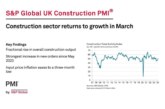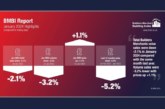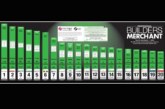
PBM Editor Paul Davies used his Viewpoint column in the magazine’s February edition to discuss the return of tighter coronavirus restrictions following a troubling rise in infections, hospitalisations and deaths.
So, here we are again. Whilst measures vary across the UK, we are back in lockdown. Of course, there are significant differences with the initial national restrictions announced on 23rd March last year, not least in the clarity that has been afforded to the building and construction sector concerning its ability to continue trading. And with a vaccine now being rolled out, there is hope borne out of expectation that the country can soon return to a surer footing.
However, for all the rhetoric about a ‘race between the virus and the vaccine’, what is really required is a demonstration that lessons have been learned over the year and also a substantial degree of expectation management. Writing this on 11th January, the current rate of infections, hospitalisations and deaths continues to surge; more stringent restrictions may yet need to be implemented to regain control of the virus and, even once the vaccination programme has been completed, it is only realistic to expect that certain measures could still be required indefinitely.
So what’s the plan; the long-term strategy for both dealing with the virus and for rebuilding the economy as the two are simply intertwined? Once again, effective communication is an imperative going forward and yet… So many times in the almost 12 months that Covid-19 has been an ever-present factor in our lives, this has simply not been effective enough.
And too often, the Government’s response has been reactive than proactive. Consequently, the measures then inevitably implemented have been more costly and draconian that they might otherwise have been.
Similarly, again, the standard of journalistic and parliamentary scrutiny has been found wanting across the board. Newspaper headlines are needlessly bombastic and short-sighted, whilst the sporadic press briefings continue to serve up far too many simplistic and effectively unanswerable (in fairness to the Government) lines of questioning. The repeated ‘it’ll be over by Christmas’ mantra of last year by press and politicians alike shows that the lessons of history are ignored.
Despite the high profile stories of lockdown rule breakers, opinion polls continue to show that public support for coronavirus restrictions remains high. But this should not be mistaken for the nation being happy about it, and that patience is increasingly wearing thin. At this vital stage of the pandemic response, an honest approach, with clear communication, is essential to ensure consent and compliance from a population that wants to continue doing ‘the right thing’.
Furthermore, greater clarity is equally essential for businesses that, having adapted in the most remarkable of ways since last March, are continually faced with the threat of conditions changing abruptly. Of course, these are unprecedented circumstances and (even more) decisive action will be required, but what is the framework? Plan A is vaccinate and get back ‘to normal’ as quickly as possible. But what of Plans B and C?
The end of the furlough scheme, already extended previously just hours before the deadline, is in sight but what happens at the end of April? Rishi Sunak may have recently introduced further measures of Government support, but a more comprehensive economic response won’t be announced until the budget in March. Is that sufficient to help businesses plan and invest?
Putting it mildly, it is not desirable for the state to subsidise an entire nation indefinitely. There will be a period when ‘the bill is paid’, and that will require truly innovative and creative solutions. But for the here and now, sustained support for otherwise viable businesses will leave us best placed for recovery in the future. Whenever that may be…
“For all the rhetoric about a ‘race between the virus and the vaccine’, what is really required is a demonstration that lessons have been learned over the year and also a substantial degree of expectation management.”









